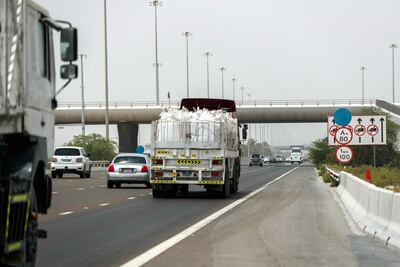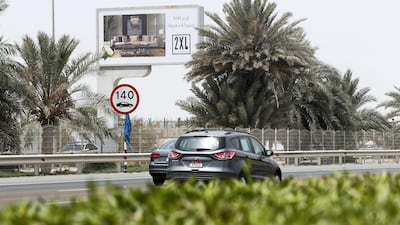Motorists across Abu Dhabi on Thursday claimed the scrapping of 'buffer zones' across the emirates could mean many more fines for drivers.
Road users said confusion over how and where the new measures were being implemented meant even law-abiding motorists risked breaking speed limits.
From Sunday August 12, drivers throughout Abu Dhabi will no longer be allowed to exceed stated road limits without penalties.
The new move, introduced by Abu Dhabi Police and the Department of Transport, aims to standardise official speed limits, improve road safety and end long-standing question marks over how fast vehicles are permitted to travel.
On most roads under the buffer scheme, motorists can drive up to 20kph faster than speed limit signs actually state.
On Thursday, Rabee Gharzdeen, 27, from Jordan, said he remained unsure whether road safety would improve.
Last year, official figures showed 230 out of 525 road traffic fatalities in the UAE were caused by speeding.
“I’m not quite sure how this is going to work,” said Mr Gharzdeen, a who regularly drives for his job. “Why change the law when there are already many traffic patrols out there to ensure everyone’s safety?
“I don’t understand where on the Abu Dhabi to Dubai road the speed limit rule will change. Abu Dhabi is scrapping the buffer but Dubai isn’t.”
Over the last few weeks, Abu Dhabi’s traffic authorities have begun rolling out measures in preparation for the law change.
New speed limit signs have been installed, and a publicity campaign launched to raise public awareness of the shift.
In most cases, it is understood speed limit signs on highways that currently read 100kph will be changed to read 120kph. Other sections of road with existing signs showing 120kph will be replaced with 140kph signs.

Hadi Hamdoun, a business executive from Lebanon, said he welcomed scrapping the buffer zone, claiming many motorists remained unclear how the existing system functioned.
He said tourists in particular often found it hard to understand why so many drivers appeared happy to break advertised speed limits.
“When I moved here eight months ago I got very confused because I’d be driving at the speed limit and people would yell at me for not going fast enough,” he said.
“Then there’d be times when I'd be yelled at to slow down — it took me about a month to figure it out.
“I think abolishing the buffer zone is a much better idea. It was so confusing before; why did the sign say 60kph when you could legally drive at 79kph without getting a ticket?
“Now people will know exactly how fast they should drive. Whether they accept that or ignore it is a different matter.”
_______________
Read more:
Abu Dhabi 20kph speed limit buffer to be removed in August
Exclusive: Abu Dhabi to phase out 20kph speed buffer on some major roads
End of the 20kph buffer? UAE police ask public for views on ending allowance.
_______________
Saeed Al Remeithi, a member of the Federal National Council, told The National he hoped the scheme's roll out would run smoothly.
“It’ll be just a matter of time before people get used to the scrapping of the speed buffer,” he said.
“Part of the problem has been those who are aware of the buffer drive fast, while people such as tourists who don’t drive slower. This has caused confusion as well as accidents.”
Maj Nasser Al Saadi, a spokesman for Abu Dhabi police, said most of the new speed signs were already in place on roads and highways.
He said a social media campaign to raise awareness of the start of the scheme this Sunday proved successful.
Thomas Edelmann, spokesman for the campaign group RoadSafetyUAE, said: “This change must go hand in hand with increased speed enforcement activities by authorities.
“There needs to be mobile radar units, a greater police presence, and an initiative to introduce sections of road where average speeds are monitored.”

